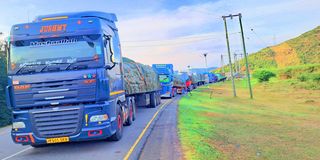Prime
Lorry owners: Why SGR cargo services will not hurt us

The Tanzania Truck Owners Association has said the expected arrival of 264 standard gauge railway freight wagons will not adversely impact its members’ businesses. PHOTO | FILE
What you need to know:
- While the SGR is a single route, lorries serve diverse destinations across the country, filling a different niche, according to lorry owners' umbrella body
Dar es Salaam. The Tanzania Truck Owners Association (Tatoa) has said the expected arrival of 264 standard gauge railway (SGR) freight wagons will not adversely impact its members’ businesses.
Instead, SGR freight services will complement Tatoa members’ operations, it added.
While the SGR is a single route, lorries serve diverse destinations across the country, filling a different niche, the association argued.
The position follows the announcement by Tanzania Railways Corporation (TRC) that a consignment of 264 SGR freight wagons is on its way to Tanzania from China.
The shipment, which is expected to arrive before the end of the year, includes 200 container wagons and 64 wagons for loose cargo.
It is part of the government’s broader strategy to expand the SGR’s freight capacity. The consignment is part of a larger order of 1,430 wagons placed with the Chinese firm CRR.
TRC said the new wagons would diversify the SGR’s cargo-handling capabilities and improve transport efficiency, signalling a major shift in Tanzania’s logistics landscape.
Speaking in an interview with The Citizen, Tatoa chairman Elias Lukumay praised the government’s efforts to involve lorry owners in shaping the Railway Open Access Regulation, 2024. The regulation allows lorry owners to procure wagons and electric multiple units (EMUs) for use on the SGR infrastructure.
Mr Lukumay emphasised the importance of enhanced security at transfer points where goods are offloaded from trains onto lorries, saying it is crucial for smooth and secure cargo transitions.
“SGR freight trains will enhance regional cargo transport, particularly to Uganda, Burundi, Rwanda and the Democratic Republic of Congo,” he said, adding that discussions with neighbouring countries are underway, with Uganda expressing interest in utilising SGR freight services.
However, there is a need to address the risk of cargo theft to ensure customers’ trust in the system, Mr Lukumay added.
Tanzania Medium and Small Truck Owners Association (Tamstoa) spokesperson Mark Gama reassured the body’s members that the SGR would not harm their operations.
He clarified that the SGR would focus on local cargo for destinations like Morogoro and Dodoma, while Tamstoa’s operations cater for international markets with transit goods.
“SGR freight wagons will not affect our business because we have diverse routes that the SGR is currently not utilising,” he said.
Both Mr Lukumay and Mr Gama said the government’s investment in the SGR is a “game-changer” for Tanzania’s logistics sector.
“If we maintain strong relations with the government, the future of cargo transportation will be both profitable and sustainable,” said Mr Lukumay.
As the SGR prepares to play a bigger role in regional trade, stakeholders are optimistic about the opportunities it offers, provided that operational efficiencies and security measures are prioritized.
Earlier this year, transporters urged investors to accelerate the introduction of freight wagons on the SGR, hoping to expand market opportunities for cargo transport.
Tatoa believes that faster freight services will allow lorry operators to capture a larger share of the cargo market, especially for countries using Dar es Salaam Port.
Mr Lukumay pointed out that lorries are currently underutised in transporting cargo compared to the potential offered by the SGR.
“We would like to see those interested in introducing freight wagons move more quickly so that lorry owners can secure more business in transporting cargo to its final destinations,” he said.
In June 2024, TRC revealed that several Tanzanian and international companies were interested in partnering with the government to operate freight services on the SGR. The list includes Tanzanian firms such as GSM, Bakhresa Group, Mohammed Enterprises, Lake Oil, Azania, and Jambo, alongside companies from China and Europe.




